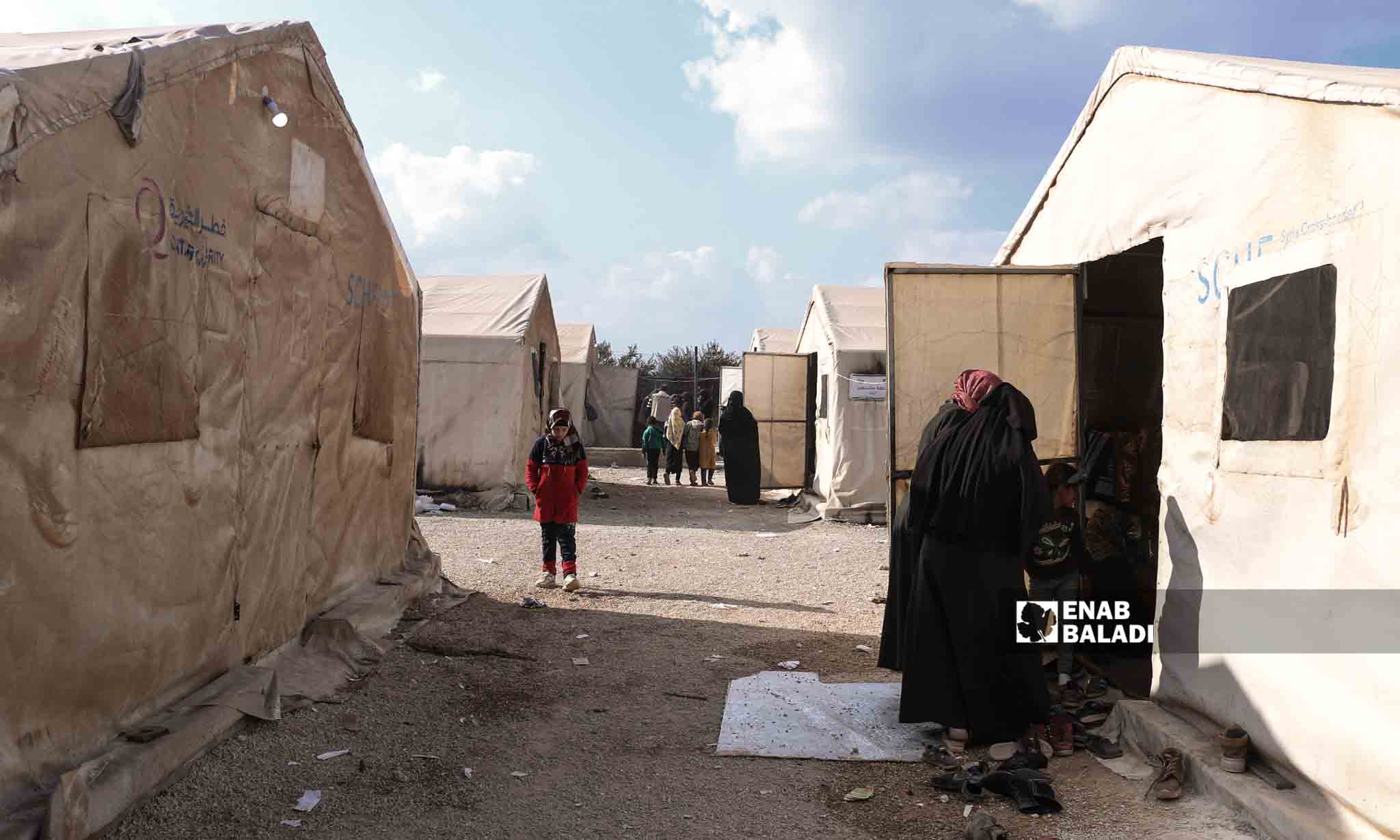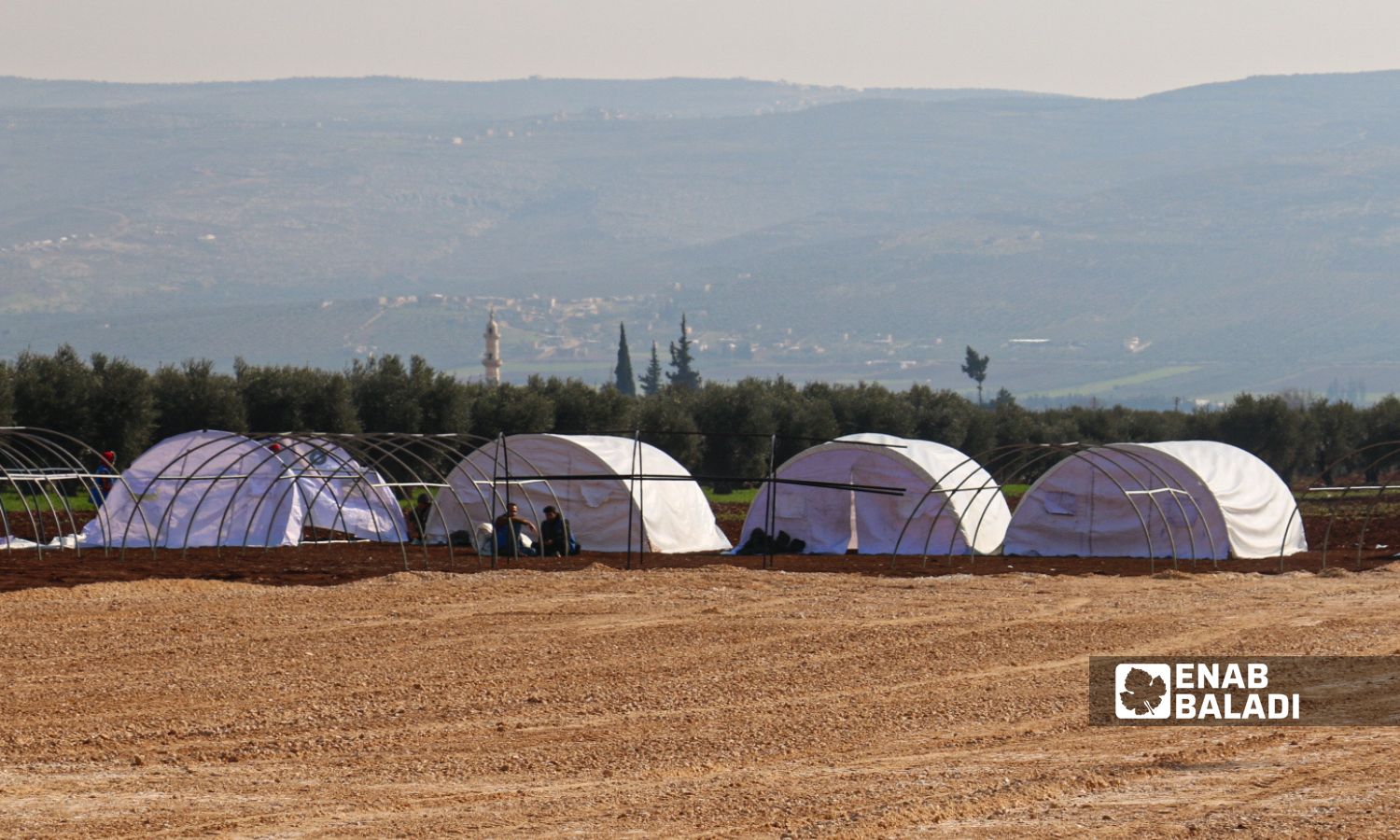



Enab Baladi – Ahmed Deeb
“(This year) There is no usual Ramadan ritual like what families used to live or see in the markets,” Ibrahim describes the atmosphere of the holy month in the opposition-held northern Syria after the Feb-6 earthquake destroyed his house and made him a displaced person.
Dozens of families were forced to take refuge in temporary shelters, which led to the absence of the usual preparations and rituals for Ramadan.
Not only the loss of relatives or family members under the quake rubble but also many factors made them receive Ramadan without preparations, like the lack of familiarity and social life in random shelters and the scarcity of basic necessities such as food, water, and health care.
The young Ibrahim al-Mohammad told Enab Baladi that the people’s preoccupation with trying to manage their lives and finding a suitable place to live in shelter centers has led to a complete absence of preparations for the month of Ramadan this year.
“The tent is overcrowded, and it does not allow others to visit you during Ramadan, which makes the month’s rituals even more absent.”
Al-Mohammad added that the days of Ramadan after the earthquake seem like normal days, as all the Ramadan rituals known to the Syrians disappeared, and the lifestyle of those affected changed after they had to move to shelters.
After the earthquake, dozens of camps were set up in response to the disaster, in addition to the squatter camps scattered extensively in the north.
The crisis worsened in those camps after the owners of houses that were not affected by the earthquake chose to stay in tents for fear of a new earthquake or aftershocks that could demolish the remaining houses.
Northern Syria is witnessing a shortage of tents, as al-Mohammad lives with his 9-member family in one tent.
The house of Ahmed Malandi, 37, was destroyed after he spent many years building it in the countryside of Jisr al-Shughour in Idlib governorate, and he was left without a job and a home after the earthquake destroyed “everything,” according to him.
Malandi added to Enab Baladi that the month of Ramadan, which is supposed to be one of the most beautiful months of the year, is very different from previous years because of the earthquake that changed everything.

Tents for people in the town of Jindires in the northern countryside of Aleppo, affected by the Feb.6 earthquake that struck southern Turkey and separate areas in Syria – February 13, 2023 (Enab Baladi/Dayan Junpaz)
The earthquake directly and greatly affected the atmosphere of Ramadan this year due to the loss of many relatives under the rubble.
The majority of people are still living in a state of shock from the earthquake, the loss of their loved ones, and the change in lifestyle, which led to the absence of intimacy and social life among the people, which is one of the basic atmospheres of Ramadan, according to al-Mohammad.
“A large number of those affected are now living in temporary shelters after the earthquake partially or completely destroyed their homes,” al-Mohammad says, adding that these centers lack the basic necessities of life and health, which doubled the spread of disease and epidemics.
Abdul Karim, a university student, says that the earthquake destroyed his house in the city of Binnish, so he moved to al-Kuwaiti camp near the town of Harbanoush in the northern countryside of Idlib.
He told Enab Baladi that “the preparations in the previous years for the holy month in the village were good, but the earthquake this year destroyed everything, and the situation deteriorated further.”
The United Nations Office for the Coordination of Humanitarian Affairs (OCHA) said that the number of buildings damaged by the earthquake in northwestern Syria has reached 10,000.
The main rescue agency in northwestern Syria, the Syria Civil Defense (SCD), estimated the number of families that were displaced by the earthquake at about 40,000 families, while the number of completely destroyed buildings reached about 550, and more than 1,570 buildings were partially damaged, in addition to hundreds of cracked buildings.
While humanitarian organizations in northwestern Syria were unable to respond to the needs of the camps before the earthquake, today they bear double burdens after the earthquake, local activists say.
A large number of affected Syrians live in a difficult living situation due to the lack of humanitarian aid and the scarcity of work opportunities in northern Syria.
“If we get some help, we can eat something in Ramadan,” Malandi said, speaking of the difficult living situation of those affected by the earthquake.
In turn, al-Mohammad said, “Even the types of food that we used to see in the previous Ramadan seasons are completely hidden from the minds of the people.”
For his part, Raed Rahal, who was displaced with his family to al-Kuwaiti camp after the earthquake destroyed his home in Maaret Misreen, pointed to the lack of aid in the camps, such as bread and monthly relief baskets that every family needs in the month of Ramadan.
Rahal appealed to organizations and relief agencies, given the difficult situation of the displaced, which they live in, in conjunction with the advent of the month of Ramadan.
Before the earthquake, the number of people living below the poverty line in Syria reached 90%, an increase of 10% over previous years.
According to an Oxfam survey of 300 displaced people in Aleppo, 90% of them said that they cannot make any plans to celebrate Ramadan because they have exhausted their last resources.
Four out of every ten Syrians, or nearly 9 million people, were affected by the earthquake, which exacerbated the humanitarian crisis, according to Oxfam.
Nearly 70% of those surveyed said their homes had been partially destroyed, and 65% of them relied on NGO aid to survive.
Also, 22% lost their jobs or sources of income, and 37% of them borrowed money to cover the needs of their families.
On January 12, the UN Deputy Special Envoy to Syria, Najat Rochdi, said on Twitter that there is an urgent need to provide additional funding for Syria, especially with about 15.3 million people in need of humanitarian assistance.
if you think the article contain wrong information or you have additional details Send Correction